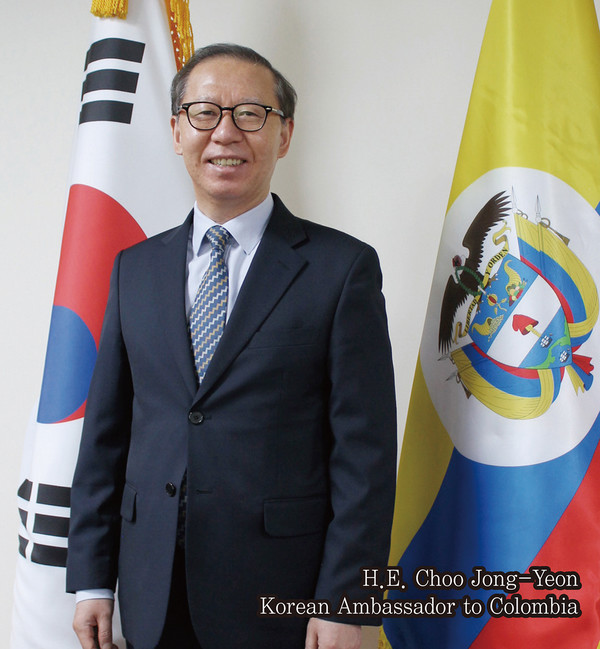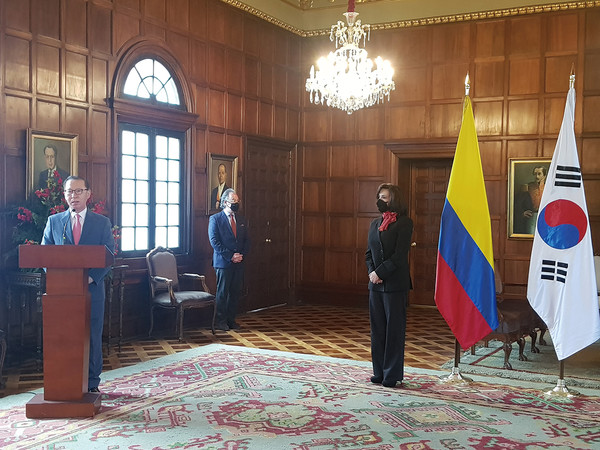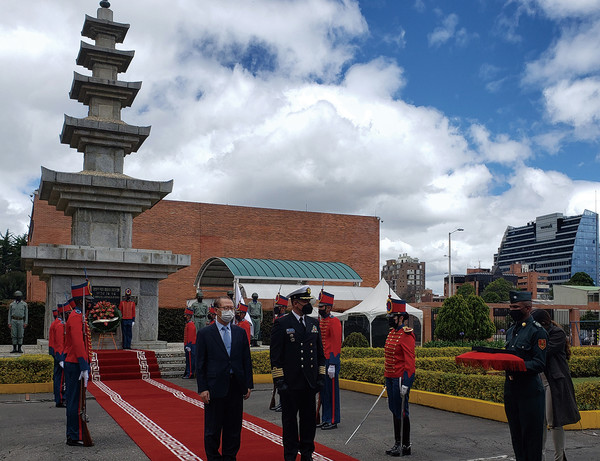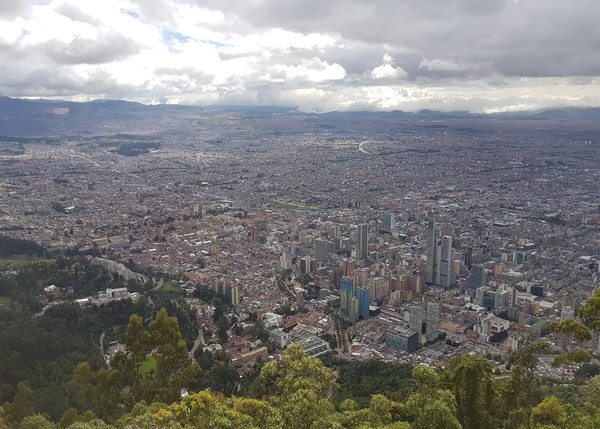
This year marks the 70th anniversary of the arrival of the Colombian battalion in Korean war and 'Seoul City' interviewed H.E Choo Jong-yeon Korean ambassador to Colombia on strengthening the Colombia Korea economic and cultural ties in the years to come.
Q. The importance of Korea-Colombia relations
Korea and Colombia have been enjoying a long-term friendship and strategic partnership and there are many things in common between the two countries. The population of both countries is same as 50 million facing the Pacific coast. Both countries are considered middle power at the international stage. Both countries have bitter experience of colonial rule and civil war. This similar painful historical experience may bring the two countries closer emotionally. Both countries also have special relations with the United States. The strong bilateral relationship between Korea and Colombia was formed based on these common denominators.
Colombia has a very important position in Korea's diplomacy towards Latin America. Colombia is a solid middle power and is the region's leading advocate of a free market economy in Latin America. Also, Colombia is a country with abundant natural resources exporting oil and coal, and natural gas is self-sufficient. It is also rich in mineral resources such as gold and emeralds. It produces various agricultural products such as coffee, flowers, palm oil, and tropical fruits. It has a lot of fishery resources as it borders the Pacific Ocean and the Atlantic Ocean at the same time. Colombia is the second most biodiversity country after Brazil. So there are plenty of genetic resources. Another important thing is that Colombia has a high affinity for Korea, Korean people and Korean products. Colombia is a strategic partner that has closely accompanied Korea.
Relations between the two countries are now closer than ever before. Over the past 10 years, two Korean presidents and a prime minister have visited Colombia, and one Colombian president and two vice presidents have visited Korea, and exchanges of top-level delegations have been made actively. Colombia's participation in the Korean War has made bilateral relations a blood alliance, and the Korea-Colombia FTA, which took effect in 2016, is a key foundation for bilateral economic relations.
Earlier this year, the Korean government re-selected Colombia as the ODA priority partner country between 2021 and 2025. This is the third time in a row following the period 2011-2015 and 2016-2020. Much attention was drawn to whether Colombia would be included again in the selection process of the third priority partner countries. This is because Colombia joined the Organization for Economic Cooperation and Development (OECD), a club of advanced countries in April 2020. Nevertheless, considering the special bilateral cooperation relationship with Colombia and the importance of the peace settlement task facing Colombia, Korean government maintained Colombia’s status as a priority partner country. This is a clear indication that how high the Korean government assesses the importance of Colombia.

Q. The significance of Colombia's 70th anniversary of the participation in the Korean War.
Colombia is the only country in Latin America to send combat troops to the Korean War. This year marks the 70th anniversary of the arrival of the Colombian battalion in Korea during the Korean War. The Colombian government decided to send troops in the late 1950s, and the following year, in 1951, a group of Colombian battalions arrived in Busan. 5,062 soldiers including both army and navy fought to protect freedom and democracy in Korea. Of those, 145 soldiers were killed, 69 were missing and 610 injured. Therefore, the relationship between Korea and Colombia is called "blood alliance."
For this reason, the Korean people and government have continuously expressed their gratitude to the Colombian people and the government. Bogota has a Korean War monument that was built with the support of the Korean government. Celebrations are sometimes held there. The Central Garden of Colombia's Ministry of Defense also has a memorial tower for the Battle of Kumsong and the Battle of Old Baldy. The city of Cartagena also has a Korean War monument shaped after the Turtle Ship for the Colombian Navy. The Korean government has been implementing various projects for the Colombian veterans who served in the Korean War. Last year, all the projects were cancelled due to COVID-19, but every year, veterans and their families are invited to visit Korea. In Bogota, we also built a center for veterans in Colombia. We are also offering scholarships for descendants of veterans. Last year and this year, we delivered masks and daily necessities to veterans and their families who are suffering from COVID-19. It is highly regretful that the number of veterans is gradually decreasing due to their age. So in 2011, the Colombian Veterans’Descendents Association was established. Our embassy is actively supporting the activities of the Veterans' Descendents Association. Even though the veterans will disappear, the great contribution of Colombia's Korean War veterans will be remembered forever through descendants of the veterans.
Participation in the Korean War was a history that was disappearing from the memory of the Colombian people. However, the Korean government and people are reviving it. The people of Colombia are proud of what they did 70 years ago, seeing Koreans constantly and sincerely expressing their gratitude. Colombia's participation in the Korean War is the most valuable asset that supports Korea-Colombia relations.

Q. Importance of Korea-Colombia FTA
The Korea-Colombia FTA, which took effect on July 15, 2016, is one of the 17 FTAs signed by Korea. The Korea-Colombia FTA is also the only FTA that Colombia has signed with Asian countries. Colombia is moving away from the U.S.-Europe centered trade structure and is placing more emphasis on Asian markets. I think the fact that Colombia's first Asian FTA partner is Korea shows how Colombia looks at Korea. Marking its fifth anniversary this year, the Korea-Colombia FTA is a strong legal foundation for both governments to support economic relations and provides many business opportunities for businessmen of both countries.
However, the reality is that the bilateral trade volume does not meet the economic scale and trade potential of the two countries. Trade between the two countries reached $1.8 billion in 2019 and was reduced to $1.27 billion in 2020 due to the COVID-19 pandemic. The bilateral trade structure has a typical complementary nature of Korea’s exporting industrial goods and importing raw materials from Colombia. Korea mainly exports electronic products, auto parts, cars to Colombia. Colombia mainly exports minerals such as bituminous coal, copper, coffee, flowers to Korea. In recent years, Colombian hydrangea, shrimp and banana have been added as new export items. Earlier this year, our government's quarantine process for Colombian avocado has been completed, and Colombian avocado has been introduced in the Korean market.
The two countries need to utilize the most of the Korea-Colombia FTA in order to achieve an larger volume and balance of trade. Korea is basically a country of import-oriented economy and consumers always buy high-quality and price-competitive products regardless of their origin. Korea imports a lot of foreign agricultural products due to low self-sufficiency in food. Colombia has various geographical and microclimate zones so there are many agricultural and livestock products. Korean consumers' demand for Colombian flowers and coffee is continuously increasing. However, in order to export more of its high-quality products to Korea, Colombia should pay much attention to study Korean consumers and the Korean market and promote its products more actively and effectively.

Q. Major tasks after taking office
I took office as an ambassador to Colombia in June 2020 when COVID-19 was in full swing. The biggest topic of conversation at that time was how to find a drastic measure to fight against COVID-19 pandemic. The world seems to normalize from the pandemic as vaccination accelerates around the world, however, it is regrettable that the spread of COVID-19 still continues in Colombia and Latin America. The people of Colombia are now facing huge challenges: safety in health and recovery from sluggish economy.
Korea has designated Colombia, a brother country that helped Korea in times of hardships, as a priority partner country for the response to COVID-19. We delivered humanitarian aid funds for the COVID-19 countermeasures and also delivered personal protective items for healthcare workers such as masks, facial protectors, and latex gloves. COVID-19 support projects are under way; worth $5 million for last year and $4.5 million for this year respectively. 40 ICUs including ventilators were provided to Engativa Hospital in Bogota, the capital city of Colombia. This year, we will expand support for equipments and facilities around Engativa hospital and strengthen Colombia's health authorities' countermeasure ability against COVID-19. I do hope that Korea's support will help the Colombian people overcome the pandemic.
Another task I have been focusing is a public diplomacy to publicize Korea to Colombian university students and general public. Due to COVID-19, it is impossible for schools and institutions to give face-to-face lectures. So I have been using a teleconferencing platform or Youtube to give lectures. It is good to have a wider audience not bound to time and space. Since I began my tenure of office, I could have more than 10 video lectures to institutions such as Colombia National University, EAFIT University, and UNAB University. I think those opportunities were made due to COVID-19 pandemic.
It is also very important for our diplomatic missions to help Korean companies enter into Colombian market. We are supporting Korean companies to win orders for major national infrastructure projects. Also, we are currently supporting Korean companies to participate in the Colombian government's digital transformation projects. We are exerting our best efforts to support Korean companies to solve their difficulties whenever required.
We are also trying to diversify and institutionalize cooperation between the two countries. We are trying to diversify our cooperation in various sectors such as health care, information communication technology (ICT), digital government, science and technology, environment, cultural contents, water treatment, tourism, and small and medium-sized enterprises. We are currently discussing 14 agreements and MOUs between the two countries to institutionalize cooperation in each field.
Q. The 60th anniversary of diplomatic ties between Korea and Colombia next year.
Korea and Colombia established diplomatic relations in 1962 and will celebrate the 60th anniversary of the establishment of diplomatic relations next year. Sixty years in Korea means 'a new beginning' at the age of sixty. With the 60th anniversary of diplomatic relations, we strongly hope that the two countries will be able to prepare a future vision for another 60 years.
Above all, the two countries share a common vision for the future. The Korean government has announced a "Korean New Deal" policy, which aims to transform its economic structure in preparation for the post-corona era, with three pillars: 'Digital New Deal', 'Green New Deal' and 'Strengthening the Social Safety Net'. Colombia has also announced a policy called "Compromiso pore el futuro de Colombia" for digital transformation and clean growth. I am quite certain that the two countries will be able to strengthen further the close cooperation based on similarities between above two policies.
In addition, both countries are cooperative partners who are actively participating in efforts to cope with climate change with the goal of realizing a carbon neutral vision through inclusive green recovery. The P4G (Partnership for Green Growth and the Global Goals 2030) summit was successfully held in Korea in May 2020. Colombian President Ivan Duque attended the meeting and annouced to hold the next P4G summit in Colombia in 2023.
There are endless new sectors of cooperation between Korea and Colombia such as; digital, environment, health care, science and technology, environment, cultural contents, tourism, bio-industry, energy, agricultural technology, auto parts, shipbuilding, etc. As a Korean ambassador to Colombia, I will exert my best efforts so that bilateral cooperations between the two countries in the various fields could bear fruitful results during my tenure of office as far as possible.

